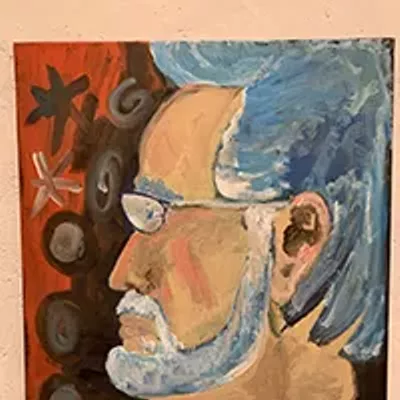The blues-inspired guitarist and singer-songwriter Rainer Ptacek succumbed to brain cancer almost eight years ago, but he left behind a legacy of brilliant albums--ranging from brooding acoustic blues to full-tilt electric boogie--and countless fans and musicians who cite Rainer's skills and kindness as part of the energy that has held together the Tucson music community.
To honor the man and his contributions to local music, several musicians will come together to play his tunes during a barbecue concert scheduled for 5:30-7:30 p.m. Sunday in the outdoor stage area at Club Congress.
Howe Gelb, Rainer's longtime friend and frequent bandmate--together, the two of them started Giant Sandworms (now called Giant Sand) 25 years ago--is organizing the event-within-an-event.
"That is gonna be just a nod to the old man, you know, lest we leave him out. He just needs to be represented," Gelb says. "And Dave Slutes offered me the slot to have a bunch of my friends or his friends from different walks of life play a song of his or a cover that he used to play."
Gelb will perform, along with Nick Augustine, the bass player with Rainer and Das Combo for many years. "And we're hoping that (drummer) Ralph will be there, but he might have another gig. Then we'll have other people sit in, too--we'll all do some Rainer."
Also committed to the tribute are country singer Ned Sutton, jazz-fusion guitarist Pete Fine, keyboardist Nick Luca and folk-rock singer-songwriter Pieta Brown.
Anders Pedersen, the Danish guitarist in Giant Sand, may also participate. Even though Pedersen never knew Rainer or saw him play, he reveres the CDs. "He is so enamored with the way Rainer played slide," Gelb says.
"Rainer wrote an essay for Guitar Player back in the 1970s on his unique chording behind the slide. I was showing him the essay, and he's been reading it over and over trying to figure out how Rainer could play the way he did. So we might have him playing a song and talking about how Rainer played in his unique way."
Indeed, the power and beauty of Rainer's recordings endures. It's gratifying when listeners who never heard Rainer play during his lifetime become fans of his music. And it holds new joys for those who have heard it for decades.
"When you play his records, they sound more vital than they ever sounded. It's astonishing," Gelb says. "It's more ballooning than my old jazz records. They still sound better than ever. I'm still getting stuff out of them--that's the way Rainer's music is for me."
Anyone who knew Rainer also will attest to the fact that he was the most modest and gentle of men. Gelb agrees.
"I believe in reverse psychology in a way. There's something about the subtleness of the way somebody displays their complete lack of pretension or ambition that shows off their important impact on the players around them. It's how his legacy has continued long after he is gone that helps define how influential he is. He's responsible for a lot of people and their attitudes and their playing together this weekend, and it's a lineage that goes way beyond that."









